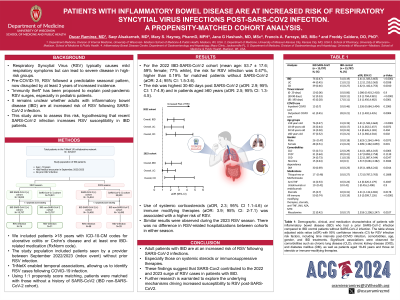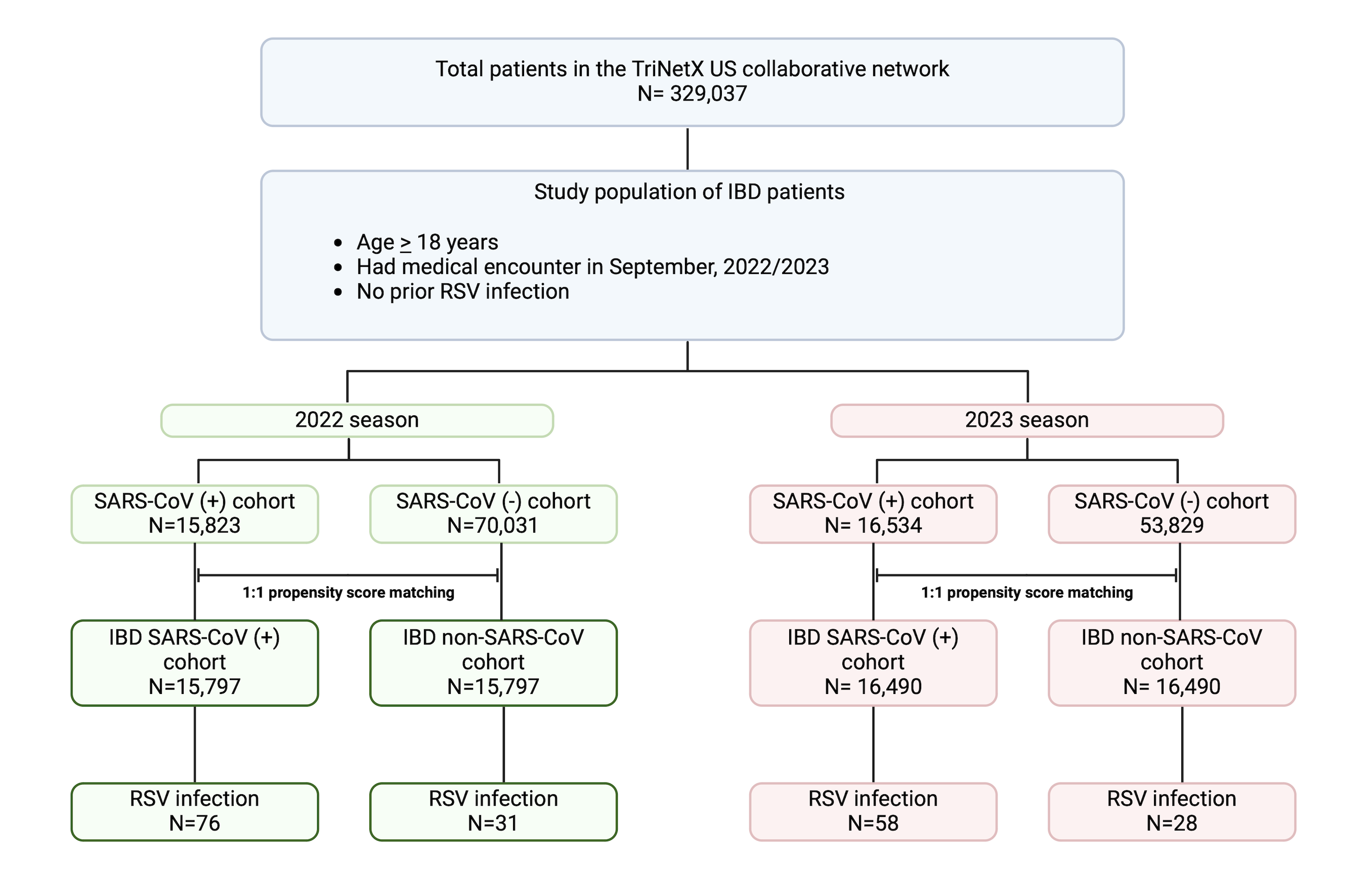Sunday Poster Session
Category: IBD
P0963 - Patients With Inflammatory Bowel Disease are at Increased Risk of Respiratory Syncytial Virus Infections Post-SARS-CoV2 Infection: A Propensity-Matched Cohort Analysis
Sunday, October 27, 2024
3:30 PM - 7:00 PM ET
Location: Exhibit Hall E

Has Audio

Oscar A. Ramirez Ramirez, MD
University of Wisconsin Hospitals and Clinics
Madison, WI
Presenting Author(s)
Oscar A. Ramirez Ramirez, MD1, Saqr Alsakarneh, MD2, Francis A. Farraye, MD, MSc3, Freddy Caldera, DO, PhD4
1University of Wisconsin Hospitals and Clinics, Madison, WI; 2University of Missouri - Kansas City School of Medicine, Kansas City, MO; 3Mayo Clinic, Jacksonville, FL; 4University of Wisconsin School of Medicine and Public Health, MIddleton, WI
Introduction: Patients with inflammatory bowel disease (IBD) are at increased risk of infections. Before the COVID-19 pandemic, respiratory syncytial virus (RSV) showed a predictable seasonal pattern, which has been replaced in the last three years with outbreaks despite years of liberalization of non-pharmacological interventions, raising suspicion for increased risk of RSV after SARS-CoV2 infections. We aimed to investigate if SARS-CoV2 infection is associated with increased risk of RSV infection in patients with IBD compared to with those without history of SARS-CoV2.
Methods: We conducted a retrospective cohort study utilizing TriNetX database to identify patients ≥18 years with IBD and SARS-CoV2 (IBD-SARS-CoV2 cohort) during the RSV outbreak seasons in 2022 and 2023. Using 1:1 propensity score matching, patients in the IBD-SARS-CoV2 cohort were matched with those without history of SARS-CoV2 (IBD non-SARS-CoV2 cohort) (figure 1). The primary outcome was to examine whether prior SARS-Cov2 infection was associated with an increased risk of RSV infection among patients with IBD. Secondary outcomes included evaluating the risk of RSV related hospitalizations, effect of comorbidities, age and medications on RSV infection following SARS-CoV2.
Results: For the 2022 IBD- SARS-CoV2 cohort (mean age: 53.7 ± 17.6; female 59%; white 77%) the risk for RSV infection during September 2023–December 2023 was 0.47% for patients with IBD with a SARS-CoV-2 infection, higher than 0.19% for the matched patients without SARS-CoV-2 (aOR: 2.4; 95% CI: 1.5-3.6); the risk was the highest 30-60 days post SARS-CoV-2 (aOR: 2.9; 95% CI: 1.7-4.9) and in patients aged ≥60 years (aOR: 2.5; 95% CI: 1.3-4.5). Use of systemic corticosteroids (aOR 2.3; 95% CI 1.1-4.6) or systemic immunosuppressant (aOR: 3.9; 95% CI: 2-7.1) was associated with a higher risk of RSV in the IBD SARS-CoV2 cohort. Similar results were noticed during the 2023 RSV season. Notably, there was no difference in RSV-related hospitalizations between the two cohorts in the 2022 or 2023 RSV season.
Discussion: Our study highlights that adult patients with IBD are at increased risk of RSV following SARS-CoV2 infection. These findings suggest that SARS-Cov2 contributed to the 2022 and 2023 surge of RSV cases in patients with IBD, especially those on systemic steroid or immunosuppressive therapies. Further research is warranted to explore the underlying mechanisms driving the increased susceptibility to RSV post-SARS-CoV2.

Note: The table for this abstract can be viewed in the ePoster Gallery section of the ACG 2024 ePoster Site or in The American Journal of Gastroenterology's abstract supplement issue, both of which will be available starting October 27, 2024.
Disclosures:
Oscar A. Ramirez Ramirez, MD1, Saqr Alsakarneh, MD2, Francis A. Farraye, MD, MSc3, Freddy Caldera, DO, PhD4. P0963 - Patients With Inflammatory Bowel Disease are at Increased Risk of Respiratory Syncytial Virus Infections Post-SARS-CoV2 Infection: A Propensity-Matched Cohort Analysis, ACG 2024 Annual Scientific Meeting Abstracts. Philadelphia, PA: American College of Gastroenterology.
1University of Wisconsin Hospitals and Clinics, Madison, WI; 2University of Missouri - Kansas City School of Medicine, Kansas City, MO; 3Mayo Clinic, Jacksonville, FL; 4University of Wisconsin School of Medicine and Public Health, MIddleton, WI
Introduction: Patients with inflammatory bowel disease (IBD) are at increased risk of infections. Before the COVID-19 pandemic, respiratory syncytial virus (RSV) showed a predictable seasonal pattern, which has been replaced in the last three years with outbreaks despite years of liberalization of non-pharmacological interventions, raising suspicion for increased risk of RSV after SARS-CoV2 infections. We aimed to investigate if SARS-CoV2 infection is associated with increased risk of RSV infection in patients with IBD compared to with those without history of SARS-CoV2.
Methods: We conducted a retrospective cohort study utilizing TriNetX database to identify patients ≥18 years with IBD and SARS-CoV2 (IBD-SARS-CoV2 cohort) during the RSV outbreak seasons in 2022 and 2023. Using 1:1 propensity score matching, patients in the IBD-SARS-CoV2 cohort were matched with those without history of SARS-CoV2 (IBD non-SARS-CoV2 cohort) (figure 1). The primary outcome was to examine whether prior SARS-Cov2 infection was associated with an increased risk of RSV infection among patients with IBD. Secondary outcomes included evaluating the risk of RSV related hospitalizations, effect of comorbidities, age and medications on RSV infection following SARS-CoV2.
Results: For the 2022 IBD- SARS-CoV2 cohort (mean age: 53.7 ± 17.6; female 59%; white 77%) the risk for RSV infection during September 2023–December 2023 was 0.47% for patients with IBD with a SARS-CoV-2 infection, higher than 0.19% for the matched patients without SARS-CoV-2 (aOR: 2.4; 95% CI: 1.5-3.6); the risk was the highest 30-60 days post SARS-CoV-2 (aOR: 2.9; 95% CI: 1.7-4.9) and in patients aged ≥60 years (aOR: 2.5; 95% CI: 1.3-4.5). Use of systemic corticosteroids (aOR 2.3; 95% CI 1.1-4.6) or systemic immunosuppressant (aOR: 3.9; 95% CI: 2-7.1) was associated with a higher risk of RSV in the IBD SARS-CoV2 cohort. Similar results were noticed during the 2023 RSV season. Notably, there was no difference in RSV-related hospitalizations between the two cohorts in the 2022 or 2023 RSV season.
Discussion: Our study highlights that adult patients with IBD are at increased risk of RSV following SARS-CoV2 infection. These findings suggest that SARS-Cov2 contributed to the 2022 and 2023 surge of RSV cases in patients with IBD, especially those on systemic steroid or immunosuppressive therapies. Further research is warranted to explore the underlying mechanisms driving the increased susceptibility to RSV post-SARS-CoV2.

Figure: Figure 1: Flowchart for cohort identification of patients in the IBD-SARS-CoV-2 cohort and IBD control cohort in 2022 and 2023
Note: The table for this abstract can be viewed in the ePoster Gallery section of the ACG 2024 ePoster Site or in The American Journal of Gastroenterology's abstract supplement issue, both of which will be available starting October 27, 2024.
Disclosures:
Oscar Ramirez Ramirez indicated no relevant financial relationships.
Saqr Alsakarneh indicated no relevant financial relationships.
Francis Farraye: AbbVie – Consultant. Avalo Therapeutics – Consultant. Bausch – Advisor or Review Panel Member. BMS – Consultant. Braintree Labs – Consultant. DSMB for Lilly. – Sits on. Fresenius Kabi – Consultant. GI Reviewers and IBD Educational Group – independent contractor. GSK, Iterative Health, Janssen, Pfizer, Pharmacosmos, Sandoz Immunology, Sebela and Viatris – Consultant.
Freddy Caldera: GSK – Consultant. GSK – Grant/Research Support. Janssen – Advisory Committee/Board Member. Janssen – Consultant. Novavax – Grant/Research Support.
Oscar A. Ramirez Ramirez, MD1, Saqr Alsakarneh, MD2, Francis A. Farraye, MD, MSc3, Freddy Caldera, DO, PhD4. P0963 - Patients With Inflammatory Bowel Disease are at Increased Risk of Respiratory Syncytial Virus Infections Post-SARS-CoV2 Infection: A Propensity-Matched Cohort Analysis, ACG 2024 Annual Scientific Meeting Abstracts. Philadelphia, PA: American College of Gastroenterology.
